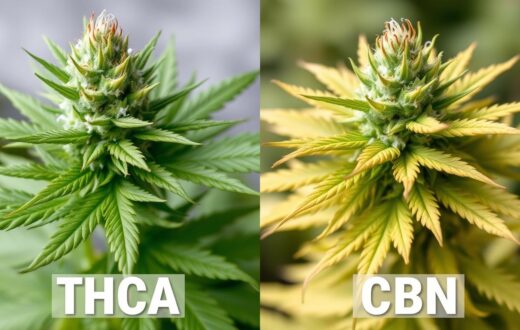Could a non-intoxicating compound from cannabis plants hold the key to managing arthritis pain? As we delve into the world of cannabinoid therapy, THCA emerges as a promising contender for natural pain relief. This raw cannabis component is stirring up interest in the medical community, offering hope to those grappling with the challenges of arthritis.
THCA, or tetrahydrocannabinolic acid, is the precursor to the well-known THC. Unlike its famous counterpart, THCA doesn’t produce a high in its raw form. This unique property makes it an intriguing option for those seeking the potential benefits of cannabis without the psychoactive effects.
Recent studies hint at THCA’s anti-inflammatory prowess, a crucial factor in arthritis management. While more human research is needed, early findings suggest THCA might offer relief without the mental health risks associated with high-potency THC use.
As we explore THCA for arthritis, we’ll uncover its properties, potential benefits, and how it differs from other cannabis compounds. We’ll also discuss practical considerations for those interested in this natural approach to pain management. Join us as we navigate the complex world of THCA and its potential role in arthritis relief.
Understanding THCA and Its Properties
THCA is a key player in cannabis medicine, getting a lot of attention lately. It’s different from THC, the well-known part of marijuana. Let’s explore THCA and its role in the cannabis plant.
What is THCA?
THCA is a non-psychoactive compound found in raw cannabis. It’s the precursor to THC, which causes the “high” from marijuana. THCA stays inactive in fresh cannabis. It only turns into THC when heated, a process called decarboxylation.
How THCA Differs from THC
Unlike THC, THCA doesn’t make you feel high when it’s raw. This makes THCA interesting for researchers looking into cannabis medicine. THC can lead to dependency and anxiety, but THCA is being studied for its anti-inflammatory qualities.
The Role of THCA in Cannabis
THCA is important in the cannabis plant. It’s found in plenty in fresh buds and leaves. When the plant dries or is heated, THCA turns into THC. This change is key for those wanting the psychoactive effects of cannabis.
But THCA itself is being recognized for its potential benefits. It might have anti-inflammatory and neuroprotective effects. Knowing the difference between THCA and THC is crucial for safe use of cannabis products. As research continues, we’re learning more about these compounds and their uses in cannabis medicine.
Arthritis: An Overview
Arthritis is a common condition that affects millions of Americans. It causes pain, stiffness, and swelling in joints. Understanding arthritis is key to effective rheumatoid arthritis management and joint inflammation reduction.
Types of Arthritis
The two main types of arthritis are osteoarthritis and rheumatoid arthritis. Osteoarthritis occurs when cartilage breaks down. Rheumatoid arthritis is an autoimmune disease that attacks joint tissue. Both types can severely impact daily life.
Common Symptoms of Arthritis
Arthritis symptoms vary but often include joint pain, swelling, and reduced mobility. Fatigue is also common, especially in rheumatoid arthritis. These symptoms can make simple tasks challenging. Effective rheumatoid arthritis management focuses on easing these symptoms.
Causes of Arthritis
The causes of arthritis are complex. Age, genetics, and injuries can play a role. In rheumatoid arthritis, the immune system mistakenly attacks healthy joints. Lifestyle factors like obesity can also increase risk. Understanding these causes is crucial for joint inflammation reduction strategies.
The Science Behind THCA and Pain Relief
THCA is a non-intoxicating compound found in raw cannabis. It’s getting a lot of attention in medical marijuana research. Unlike THC, THCA doesn’t make you feel “high.” Scientists think it could be a good alternative for treating arthritis.
How Cannabinoids Interact with the Body
Cannabinoids, like THCA, work with our body’s endocannabinoid system. This system is important for managing pain. THCA interacts with this system in a way that’s different from THC.
It doesn’t bind directly to cannabinoid receptors, which is why it doesn’t cause psychoactive effects. Instead, THCA might affect other pathways in the body. These pathways control inflammation and pain.
Research on THCA for Pain Management
Studies on THCA are still in the early stages, but they’re showing promise. Lab tests suggest that THCA might reduce inflammation and protect nerve cells. This could be good for managing arthritis pain.
Unlike THC, THCA doesn’t cause a “high.” This makes it an interesting option for pain relief. As research continues, we’re learning more about THCA’s potential benefits for arthritis.
Its anti-inflammatory properties could help with joint pain and swelling. While more human studies are needed, the current data is encouraging. THCA might be a valuable tool in managing arthritis.
Benefits of THCA for Arthritis
THCA is showing great promise for treating arthritis naturally. It’s found in raw cannabis plants and has unique properties. These could help those looking for natural pain relief.
Anti-Inflammatory Properties
THCA’s ability to fight inflammation is a major area of research. It might help reduce swelling and pain in joints. This could offer relief without the high of THC.
Potential for Chronic Pain Relief
Many with arthritis find THCA products help with chronic pain. It works with our body’s endocannabinoid system to ease discomfort. This makes THCA a good alternative to traditional pain meds.
THCA also has neuroprotective qualities that could help joint health long-term. It protects brain cells from damage. Early studies suggest THCA could be a key part of treating arthritis naturally.
Ways to Consume THCA for Arthritis
THCA is a non-psychoactive compound found in raw cannabis plants. It’s seen as a promising alternative for arthritis treatment. Unlike THC, THCA doesn’t bind well with brain receptors. This makes it a good choice for those looking for relief without getting high.
Raw Cannabis and Juicing
Raw cannabis consumption is a way to get THCA’s benefits. Juicing fresh cannabis leaves keeps THCA content high. This method lets arthritis sufferers enjoy anti-inflammatory effects without the high from heated cannabis.
Tinctures and Oils
THCA tinctures and oils offer precise dosing and easy use. They’re made from cannabis strains rich in THCA. This makes them a handy way to manage arthritis daily. Users can adjust their intake as needed.
Edibles and Capsules
For a discreet option, THCA edibles and capsules are available. They allow for controlled dosing and fit easily into daily routines. Remember, THCA turns to THC when heated. So, these products are made without heat to keep THCA’s unique benefits.
When considering THCA for arthritis, talking to healthcare professionals is key. While THCA looks promising, more research is needed. As with any cannabis medicine, start with low doses and watch for effects.
Dosing THCA for Effective Relief
Finding the right THCA dosage is crucial for arthritis relief. Research shows THCA, a non-psychoactive cannabis compound, is powerful in therapy. To get the best results, consider several factors when dosing.
Finding the Right Dosage
Start with a low THCA dose for pain management. This helps you see how your body reacts and avoids side effects. Increase the dose slowly until you find the right amount for relief without side effects. Remember, THCA can be taken in high doses without causing a high, as long as THC levels are very low.
Factors Influencing Dosage
Several things affect the ideal THCA dosage for arthritis relief. Your body weight, how severe your symptoms are, and how sensitive you are to cannabinoids matter. The cannabis strain used also impacts pain relief due to differences in cannabinoids and terpenes.
THCA’s strong anti-inflammatory properties make it a great natural treatment for conditions like rheumatoid arthritis. For the best results, talk to a healthcare professional who knows about cannabis medicine. They can guide you through the dosing process and make sure THCA fits into your treatment plan. By watching how you respond and adjusting as needed, you can get the most out of THCA for arthritis relief.
Legal Status of THCA in the United States
The legal status of THCA in the U.S. is complex. This part of cannabis is seen as a possible treatment for arthritis. It’s important to know the laws if you’re thinking about using it for medical reasons.
Federal Regulations
Under federal law, THCA from hemp is okay if it has less than 0.3% THC. This rule comes from the 2018 Farm Bill. It makes hemp and its products legal. THCA is legal because it doesn’t get you high and might help with arthritis.
State Laws on THCA Use
State laws on THCA are different everywhere. Some states allow medical marijuana, which might include THCA. Others have stricter rules. For example, in some places, you can get THCA for arthritis from licensed shops.
THCA’s legal status is changing as research grows. Studies are looking into its benefits for arthritis and other conditions. If you’re thinking about using THCA, talk to a doctor and keep up with local laws.
Potential Side Effects of THCA
THCA is a key part of cannabinoid therapy, offering natural pain relief. But, like any treatment, it can have side effects. Let’s look at these and who should be careful with THCA.
Common Side Effects
Most people find THCA easy to tolerate. However, some might feel a bit uncomfortable. Nausea and upset stomach are common complaints.
Some users might also experience skin irritation, especially if they apply it topically. These issues are usually mild and don’t last long.
Who Should Avoid THCA?
Some groups should be cautious with THCA. Pregnant or breastfeeding women should avoid it because there’s not enough research. People who are sensitive to cannabis might react more strongly.
Those taking certain medications should talk to their doctor first. THCA might interact with some drugs. It’s important to be careful.
Remember, THCA is non-psychoactive, unlike THC. It won’t make you feel “high.” Still, start with a low dose and gradually increase it. If you’re thinking about using THCA for pain, talk to a healthcare provider. They can help you understand the benefits and risks for your situation.
Combining THCA with Other Treatments
THCA is showing great promise for treating arthritis. Many people find it helps when used with traditional treatments. This mix can lead to better pain relief and a better life for those with arthritis.
Integrating THCA with Traditional Medications
Before adding THCA to your treatment, talk to a doctor. They can help you use THCA safely with your current meds. Some people need less pain medicine with THCA, but always check with a doctor first.
Complementary Therapies
Arthritis care can also include other therapies with THCA. Physical therapy can make joints move better and stronger. Acupuncture might help with pain too. Eating foods that fight inflammation can also help your joints.
Research shows THCA might help with arthritis because it fights inflammation. Studies show it can lower inflammation in people with arthritis. Using THCA in a holistic treatment plan can help manage rheumatoid arthritis better. It offers a natural way to ease symptoms.
User Experiences: THCA for Arthritis Relief
Many arthritis patients are trying cannabinoid therapy as an alternative. THCA, a non-psychoactive part of raw cannabis, is getting attention. Let’s look at real experiences and expert views on THCA’s benefits for arthritis.
Testimonials from Patients
Sarah, 58, with rheumatoid arthritis, said: “I’ve used THCA oil for six months. My joint pain has gone down a lot. I can move easier now.” Mike also saw benefits, saying his sleep improved and inflammation lessened with THCA.
Expert Opinions on Effectiveness
Dr. Emily Chen, a rheumatologist, says: “We need more studies, but early signs show THCA might help with arthritis.” Dr. James Smith, a pain expert, warns: “THCA looks promising, but talk to your doctor before trying it.”
As research goes on, THCA’s place in treating arthritis is still being studied. Patients thinking about this option should look at both personal stories and scientific studies. This helps them make smart choices about their health.
Future Research Directions
The study of medical marijuana is growing fast, with THCA showing great promise for arthritis relief. As cannabis medicine becomes more popular, scientists are looking into new ways to understand THCA’s benefits.
Areas of Study for THCA
Researchers are studying how THCA works in the body. They want to know how it affects pain and inflammation. They’re also exploring the right doses and how it might interact with other drugs.
Long-term Benefits of THCA for Arthritis
Long-term studies are needed to fully grasp THCA’s benefits for arthritis. Scientists are looking at its effects on various types of arthritis and if it can slow disease growth. These studies aim to see if THCA offers lasting relief without major side effects.
THCA research is looking bright. With over 150 cannabinoids found in Cannabis sativa, THCA is a standout for arthritis treatment. As hemp cultivation grows and laws relax, we’ll see more exciting studies. This research could lead to new cannabis-based medicines, offering hope to millions with arthritis.
Comparing THCA with Other Cannabis Compounds
Cannabis plants have many cannabinoid compounds. These chemicals might help treat arthritis. Let’s see how THCA compares to other famous cannabinoids.
THC vs. THCA
THC and THCA are similar but different. THCA is in raw cannabis and doesn’t get you high. When heated, it turns into THC, which does get you high.
THC is known for its pain relief and appetite boost. THCA might reduce inflammation without the high feeling.
CBD and THCA: A Comparison
CBD is another non-psychoactive cannabinoid that’s popular. Like THCA, it doesn’t get you high and has anti-inflammatory effects. CBD was found in the 1940s, while THC was isolated in 1964.
Both CBD and THCA might help with arthritis. They work in different ways in the body. Some people find mixing them helps manage symptoms. As research goes on, we learn more about using them for arthritis treatment.
THCA and the Endocannabinoid System
The endocannabinoid system (ECS) is vital for controlling pain and inflammation in our bodies. THCA, found in raw cannabis, interacts with this system in special ways. This interaction is why THCA might be a natural pain relief option.
How THCA Interacts with the ECS
THCA doesn’t bind directly to ECS receptors like THC does. Instead, it affects the central nervous system indirectly. This might be why THCA doesn’t make you feel “high” like THC does. Yet, THCA still shows promise for its anti-inflammatory effects.
The Importance of the ECS in Pain Management
The ECS is key for managing pain. It helps control pain signals in the body. THCA’s interaction with the ECS might help reduce inflammation and offer natural pain relief. This makes THCA interesting for those looking for alternatives to traditional pain meds.
Research on THCA is still in its early stages. But, its potential benefits for conditions like arthritis and inflammatory bowel disease are promising. As we learn more about THCA and the ECS, we might find new ways to manage chronic pain naturally. This could lead to more effective cannabinoid therapy options in the future.
Practical Considerations for Patients
Exploring holistic arthritis care means looking at several factors. THCA, found in cannabis, shows promise in managing arthritis symptoms. But, it’s important to understand the practical side of using THCA.
Consulting Healthcare Professionals
Talking to a doctor who knows about cannabis is crucial. They can help add THCA to your treatment plan and watch its effects. This is important because arthritis affects millions, and each case is different. Your doctor can advise on dosage and how it might interact with other medicines.
Legal and Accessibility Issues
The laws on THCA vary in the United States. Some states allow medical marijuana research, while others have strict rules. Check your local laws to know what’s allowed. Getting THCA products can be hard, depending on where you live.
Quality is also a concern, as the cannabis industry isn’t regulated the same everywhere. Look for trusted sources and products that have been third-party tested. This ensures safety and effectiveness in your holistic arthritis care journey.
Conclusion: Is THCA the Right Choice for You?
As we finish our look at THCA for arthritis, it’s clear that it might be a good option. THCA is a non-psychoactive part of cannabis that could help with pain without the usual high.
Summary of THCA Benefits
THCA could help with inflammation and protect the brain. It’s a natural way to ease arthritis pain. Plus, it doesn’t make you feel high, so you can use it every day without losing focus.
Making an Informed Decision
Thinking about THCA for arthritis? You should look at its benefits and your own needs. Also, check the laws in your area. Hemp products with less than 0.3% THC are legal under federal law, but state laws can differ.
Choosing THCA for arthritis is a big decision. You need to think about your symptoms, health, and what you want to achieve. Keep up with new research to make the best choice for you. Everyone is different, so what works for one person might not work for another.















